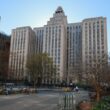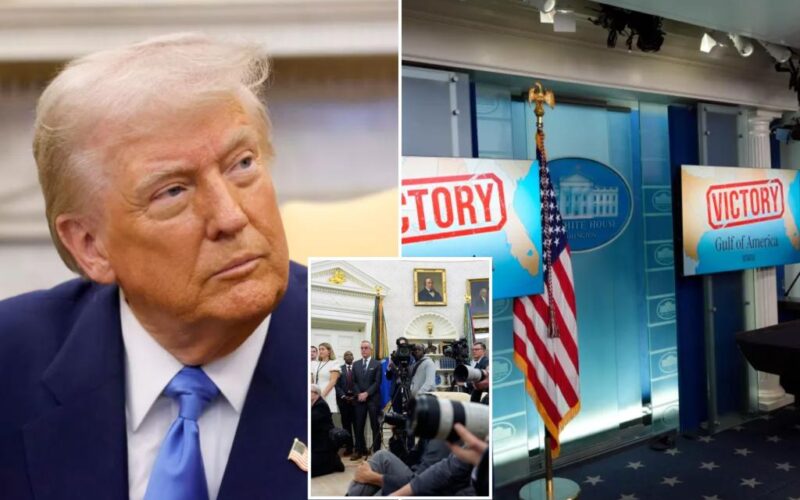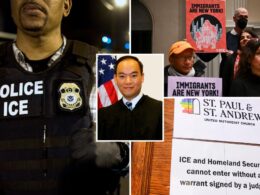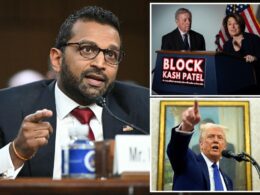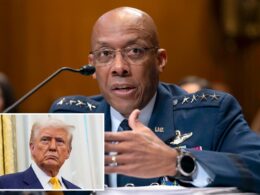WASHINGTON — A federal judge on Monday rejected the Associated Press’ request for a temporary restraining order requiring the White House to restore the news wire’s access to President Trump — handing his administration an initial win in the legal struggle.
Judge Trevor McFadden cited the fact that the AP waited more than a week to file the suit as evidence that there wasn’t a “dire situation” or “irreparable harm” caused by waiting for a trial, according to reporters in the courtroom.
The decision came as a surprise — with the AP widely expected by the White House press corps to be favored to win the initial ruling in the standoff triggered by the organization’s refusal to change its style guide to identify the Gulf of Mexico as the “Gulf of America” after Trump changed the official US name.
“As we have said from the beginning, asking the President of the United States questions in the Oval Office and aboard Air Force One is a privilege granted to journalists, not a legal right,” the White House said in a statement after the court hearing.
“We stand by our decision to hold the Fake News accountable for their lies, and President Trump will continue to grant an unprecedented level of access to the press,” the spokesperson added. “This is the most transparent Administration in history.”
The AP argued in its lawsuit that its free speech and due process rights were being violated by being refused access to Trump’s events, including as members of the daily press pool.
McFadden, who was nominated by Trump during his first term, hinted that he believed the AP might have a better shot when the matter goes to trial — another surprise, as that had been viewed by insiders as a shakier stage in litigation for the wire.
The judge said at one point he considered it “problematic” that the White House had “just discriminated against one organization.”
Initial press-access rulings have favored journalists in the past.
Journalists Jim Acosta of CNN and Brian Karem, now of Salon, had their press badges swiftly restored in Trump’s first term after they were revoked for refusing to relinquish a microphone at a press conference and exchanging heated words with a Rose Garden guest, respectively.
Associated Press reporters traditionally have enjoyed VIP access to presidents compared to journalists from other outlets because they are deemed a “wire” service — alongside Reuters and Bloomberg.
The three wires — which allow their articles and photos to be republished by other news sites — have seats on all Air Force One trips, attend all Oval Office pool sprays and are present at all events open to the press when presidents either travel or remain at the White House.
Most other print news outlets, including The Post, the New York Times and other major newspapers, get only one opportunity a month to serve as a representative in the in-town White House press pool that interacts with the president.
Non-wire outlets granted access to the traveling press pool similarly have far fewer opportunities for Air Force One trips, sharing a seat among more than a dozen other outlets.
The pool is assembled through historical deference by the White House Correspondents’ Association, an organization that comprises outlets covering the White House.
The AP’s exclusion has broadly troubled news outlets concerned about historical precedent.
Trump said last week that he personally approved of the exclusion.
“We’re going to keep them out until such time as they agree that it’s the Gulf of America,” Trump said at a press conference at his Mar-a-Lago residence in Palm Beach, Fla.
The Trump White House has argued that it’s taken steps to increase press freedom, despite the AP fight.
Press secretary Karoline Leavitt, who is named in the lawsuit, began her tenure vowing to restore 400 press badges that the Biden administration revoked under a policy designed to screen out independent journalists.
She also launched a new 50th briefing room seat that would be occupied by a rotating cast of social media influencers and journalists without a permanent seat in the room.
Other administrations have restricted press access at the White House in the past.
The Obama administration attempted to boot Fox News out of the TV rotation for the press pool, but relented when other networks threatened to boycott.
The Biden administration, meanwhile, aggressively screened journalists allowed into large events that under past presidents were open to all reporters on campus, such as events in the Rose Garden, East Room and an auditorium in the next-door Eisenhower Executive Office Building.
Biden restrictions barred The Post, which had reported heavily on the president’s involvement in his family’s foreign business dealings, from such events for seven months — sometimes citing space constraints before leaving two dozen press seats empty.
Those restrictions were relaxed but never fully scrapped before Biden left office.

